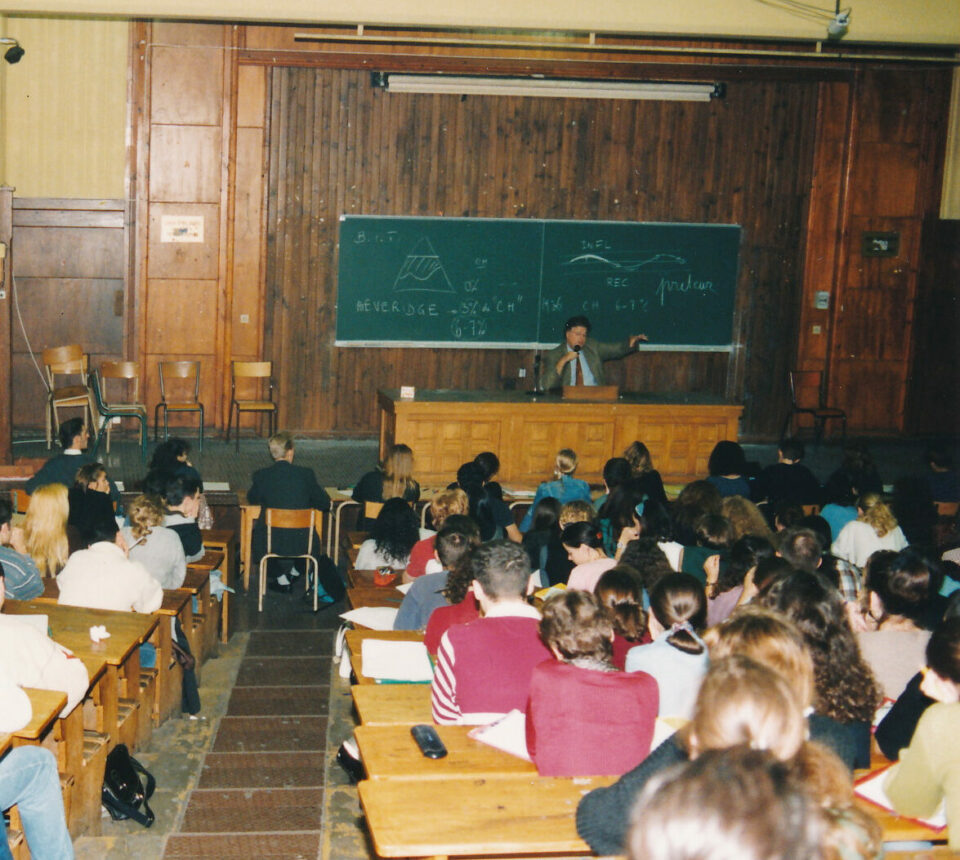Georges Frêche, a Monday in Amphi A
On October 22, the University of Montpellier, and more specifically the Faculty of Law and Political Science, paid tribute to Professor Georges Frêche, who passed away ten years ago. A look back at the career of an outstanding academic and political figure who didn't wait for posterity to build his own legend.

"I was his student in the late 70s, and it was a blessed time," recalls Claude Cougnenc, president of theAssociation of Friends of Georges Frêche. We had a very direct relationship with him. In the lecture hall, we challenged him directly, and there was friction because he had difficulty accepting contradiction. This friction didn't prevent the professor from taking his student on a political adventure that would last over thirty years, making him his friend and most loyal collaborator.
Students, fellow academics, political companions - and often all three at the same time - many in the Salle des Actes on this Thursday, October 22, are nostalgically reminiscing about their Monday classes in Amphi A. Less for their passion for the history of law than for the memory of an "extraordinary" professor, in the words of Michel Miaille, who shared classes with him in the 80s and 90s. We'd write our questions on little notes and pass them from hand to hand, and Georges Frêche would answer," recounts Hussein Bourgi, now a senator for the Hérault region. He tackled every social issue without taboo: condoms, abortion, secularism, the wearing of the veil...".
"Nothing dumber than a specialist".
Ten years later, Carine Jallamion, his former assistant and now vice-dean of the Faculty of Law, still recalls those moments with great emotion. "He was always telling us that a good student should know about everything. "There's nothing more stupid than a specialist", he used to repeat in his flowery language. He didn't like pure scientists, who in his eyes had no practical experience. In fact, he never missed an opportunity to demonstrate this during his impromptu lectures on themes chosen by his students. "He loved to pass on his knowledge, he couldn't do without it. Passing on his vision of the world as a mayor and as a teacher. He mixed these two experiences without any tongue in cheek."
With a ferocity that none of his former students would dare to deny, "he liked to scare people a little, and could assassinate you in a single sentence while admitting to a riposte. He could even laugh about it," continues the vice-dean. Georges Frêche also had the art of leaving it to no one else to write his legend, "even if it meant telling us stories that weren't at all credible, but so funny. He used to tell us that he had danced at the Moulin Rouge with Line Renaud to pay for his studies! A whimsy that in no way detracted from the talent of the man whom Professor Michel Miaille compares to a "modern Socrates who knew how to involve students in the construction of knowledge".
"This faculty meant a lot to him, and of all the ceremonies organized in his honor this year, it's the one Georges Frêche would have preferred," adds Hussein Bourgi, "It's thanks to it that he contracted this love marriage with Montpellier. Thanks to her, he met Claudine, his wife, and many of his political companions, Claude Cougnenc, Christine Lazerges, Paul Alliès. And his opponents too, with Olivier Dugrip at the forefront. Guylain Clamour, dean of the Faculty of Law and Dean Dugrip's assistant at the time, has not forgotten the fights between the two rivals: "He was passionate and combative, and there were fights [...] but if these two men were largely opposed to each other in this university and in politics, they both had a sufficiently high viewpoint to regard each other with respect and consideration."
"Itinerary of an atypical provincial
Born in Puylaurens in the Tarn region of France, Georges Frêche had initially planned to seal his destiny in Toulouse. There, he completed his secondary education, followed by a preparatory course at the Lycée Joffre in Montpellier, before heading for Paris, where, in addition to a faultless intellectual career, he would lead, in the words of Michel Miaille, "the itinerary of an atypical provincial". After graduating from the prestigious Ecole Pratique des Hautes Etudes, in 1961 he went on to study at the renowned HEC business school, from which he retained "a taste for practicality, enterprise and development.
Turning his back on a promising career as a company director, he began a double degree course in law and history at the Sorbonne and the Paris Faculty of Law, from which he graduated with two doctorates in 1969. His Parisian background in no way detracted from his regional roots, as his history thesis focused on Puylaurens in Languedoc, a Huguenot town from the Edict of Nantes to the Hundred Days, and his law thesis on Toulouse and the Midi-Pyrénées region during the Enlightenment. " The Parisian by adoption never ceased to be a Languedoc man at heart and in spirit," continues his former colleague.
A paradox that characterized him throughout his life. A provincial of international renown, Chevalier des Palmes Académiques, Commander of the German and Spanish Orders of Merit, and of the Hellenic National Order, not forgetting his Honorary Doctorate from Kingston University. "With his feet in the clay and his head in the stars, as he liked to say. A professor of legal history who quoted Lao Tse, a man of the Enlightenment who admired Machiavelli," concludes the professor.
"Law and medicine, Montpellier's two legs
Back in 69. After adding an agrégation in public law and political science to his brilliant list of honors, Georges Frêche chose a position at the University of Toulouse. Politics had already become an integral part of the young Maoist's life, and he would confess a few years later that he "chose this faculty because I already wanted to run for mayor". However, he was eventually refused a position in Toulouse, and in 1970 he was offered one in Montpellier. A city he would never leave.
Elected mayor just seven years later, he never ceased to propel Montpellier into the ranks of the great metropolises. "For him, Montpellier had two legs: law and medicine. This was the starting point for the city's international development," explains Hussein Bourgi.
For Philippe Augé, President of the University of Montpellier, "It was around knowledge that the visionary Georges Frêche built the development of Montpellier, and today we can only observe the balance and harmony with which he has achieved it. He developed medicine to the north, with plans to relocate the Faculty of Medicine, the economy to the south with Richter, and the sciences to the west, with the prospect of the Balard chemistry cluster that we inaugurated two years ago.
When Georges Frêche became president of the region in 2004, he made the reunification of the universities one of his major projects, "at the cost of a great deal of hand-wringing with the university presidents", recalls Philippe Augé. It was also he who secured the funding for Opération campus, "not because his project was better than the others, but because he didn't hesitate to commit himself, promising 50 cents where the State would put in 1 euro. He was a great builder. He was a great builder, and his projects never stopped him from returning to his A lecture hall every Monday. It was in the spring of 2007 that he gave his last lecture. On that day, Guylain Clamour stood at the back of a packed auditorium and heard his words spoken in a voice trembling with emotion: "For years, because I had young people around me, I thought I was young.
